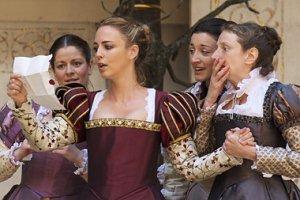Anne Boleyn - Shakespeare's Globe 2010
Henry VIII's second queen falls under the spotlight in this new play written by Howard Brenton, a playwright who is no stranger to the Globe. His historical play 'In Extremis', about the love affair between Abelard and Héloise, was premièred in 2006 and had a further run only a year later.
The Tudors - and especially Henry VIII - still have a fascination for the British. Henry VIII and his six wives have bequeathed us a crowd-pulling story of lust and political intrigue which still seems to have considerable mileage in it. Here, the focus is on Henry VIII's second wife, Anne Boleyn, who bore Henry one child who survived into adulthood and became the 'virgin' Queen, Elizabeth I.
The story starts with Anne Boleyn speaking to us from beyond the grave. In other words, she's already met her end by beheading. The scene moves on quickly to the court of James I where we meet 'The wisest fool in Christendom', the Scottish king James VI, who became King of England on the death of Elizabeth I. It's more than 70 years after Anne's death, and James is assessing his inheritance when he discovers some of Anne's belongings including a copy of a banned book and her wedding dress. At this point, you may already be starting to wonder which history books you ought to be mugging-up on before seeing this play, as there are quite a number of characters in the storyline.
From the court of James I, we flip back in time to the days of Henry VIII and his 'Great Matter': how to secure the succession under a male heir. Henry desperately wanted to leave a son at the helm when he faded into oblivion, and it became his overwhelming obsession, leading to the split from the Catholic church under the Pope. At court, we discover how Anne met King Henry, and we meet the other principal characters and political conspirators in the Tudor court: Cardinal Wolsey, Thomas Cromwell and the ever-lustful King Henry himself.
What Howard Brenton manages to do in this play is to look at events from the viewpoint of Anne herself and to humanise the towering characters that most of us have known from childhood. In Brenton's dialogue, and John Dove's intuitive direction we find humour in Henry's desire to bed Anne, in Wolseys sudden fall from grace, and when Anne shares with us her true feelings about Catherine of Aragon - "Catherine is such a cow" she tells us.
James Garnon steals the show as James I. Garnon exploits some of James's more unusual mannerisms such as a tic which causes him to jerk back his head at regular intervals. But Garnon also presents us with a highly educated and intelligent James I, who, in spite of his odd mannerisms, was able to debate with the most learned of scholars. Anthony Howell is King Henry, kept on the hook by Anne for seven long years, and almost driven insane by desire. John Dougall gives us an unnerving Thomas Cromwell who wields power with exceptional commitment, and is able to abandon Anne when it suits his political ambitions. Miranda Raison is the determined, charming and beautiful Anne Boleyn, a capable woman with political intuition as well as the nerve to match her religious convictions.
Howard Brenton seems to be saying in this play that Anne Boleyn's legacy was that she started a chain of events that changed the religious landscape of Britain for ever, and that others were still dealing with the consequences long after her demise. In the play, James I says "Anne, tell me what you began and I will end it". I don't think there's any doubt about the fact that the split from Rome which allowed Henry to marry Anne had ramifications well into the political future, but I can't help feeling that the chance to include James I - much under-used as a character in dramatic works - was too much of a temptation for Brenton to resist.
In a sense, it doesn't matter what Brenton's motives were for featuring James I, because the result is an admirable, skilfully-written play that charms, seduces, amuses and keeps everyone involved. And, in the end, we don't go to the theatre to cram history, we go to be entertained and Brenton's 'Anne Boleyn' does that 'in spades'.
"Academics may pounce on Brenton's play, but it eschews mock-Tudor costume drama to offer a compelling portrait of a woman contentiously described by James I as 'the whore who changed England'."
Michael Billington for The Guardian
"Brenton's earthy script has some snappy lines, and director John Dove manages to coax appealing shading from the supporting cast."
Fiona Mountford for The Evening Standard
"Elegant production with period chamber music is rich, invigorating, historical drama."
Quentin Letts for The Daily Mail
"The play ends perfunctorily and tritely (even more so in performance than in the published text), but the journey to that point is a compelling one."
Ian Shuttleworth for The Financial Times
"Captivating...ebullient, zesty production."
Dominic Cavendish for The Daily Telegraph
External links to full reviews from popular press
Guardian - Financial Times - daily Telegraph
Originally published on
